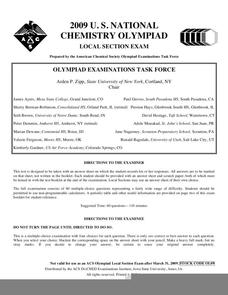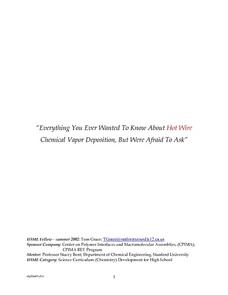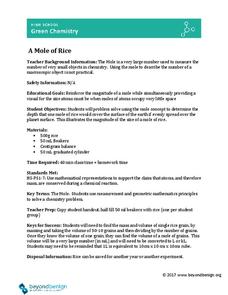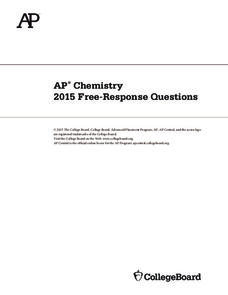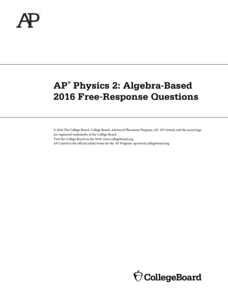Science Geek
Measurement of Pressure and Temperature
We all have standards and scientists are no exception. Presentation covers standard temperature, standard pressure, temperature conversions, and absolute zero. It explains pressure using pascals, mm of mercury, atmosphere, and torr, then...
Virginia Department of Education
Matter and Energy: Equations and Formulas
Using simple materials, an informative lesson demonstrates the Law of Conservation of Matter and explains how to balance chemical equations. Young chemists perform experiments, analyze reactions, and balance chemical equations on their...
Virginia Department of Education
Mystery Iron Ions
Young chemists perform an experiment to determine if a compound is iron (II) chloride or iron (III) chloride. Then they determine the formula, balance the equation, and answer analysis questions.
Curated OER
2007 U.S. National Chemistry Olympiad Local Section Exam
Sixty multiple choice questions cover the entire gamut of chemistry concepts. This is the local section of the U.S. National Chemistry Olympiad, where your chemistry candidates take a shot at entering the national competition. They...
Curated OER
2000 U.S. National Chemistry Olympiad Local Section Exam
This 60-question comprehensive exam was designed to determine who would go on to compete in the 2000 US National Chemistry Olympiad. Hopefuls answer multiple choice questions regarding all chemistry topics taught in the first year...
Curated OER
Real Life Chemistry (for the Business World)
In this real life chemistry instructional activity, high schoolers are given 12 problems to solve by converting from one unit to another. Students are given conversion factors to find their answers including finding the number of moles...
Curated OER
2009 U. S. National Chemistry Olympiad - Local Section Exam
Here is a copy of a past national challenge exam that you can use in your general chemistry course as a unit or semester review. Sixty multiple-choice questions query learners on properties of matter, stoichiometry, reactions, and...
Curated OER
2001 U.S. National Chemistry Olympiad National Exam Part II
Only eight problems are on this competitive national chemistry exam. It required the balancing of chemical equations, solving stoichiometry questions, and more. This is part two of three of the national exam. Also available is a local...
Curated OER
Everything You Ever Wanted To Know About Hot Wire Chemical Vapor Deposition, But Were Afraid To Ask
To wrap up your year of general chemistry, have lab groups compete in a tot wire chemical vapor deposition (HWCVD) competition. With their foundation in chemical nomenclature, stoichiometry, and gas laws, each group completes several...
Curated OER
Relating Moles to Coefficients of a Chemical Equation
High schoolers investigate the coefficients in a chemical equation and their relation to moles. In this moles and coefficients lesson plan, students perform a single replacement reaction of copper (II) sulfate and zinc and find the ratio...
Curated OER
Measuring for Chemistry: Moles, Compounds, and Conversions
Through a station rotation activity, scientists complete 9 chemistry activities to complete this interactive learning exercise. Concepts include molar masses, percent composition, accuracy vs. precision, mass of an object, scientific...
Beyond Benign
Mole of Rice Activity
Learning about the mole using rice is pretty nice! Help your chemistry scholars visualize the concept of a mole of substance with an easy-to-perform lab. Partnered pupils find the mass of a single grain of rice and relate this...
College Board
2015 AP® Chemistry Free-Response Questions
More than 80,000 scholars earned college credit for Chemistry with the AP exam in 2015. The College Board released the free-response questions covering topics, including moles, that often confuse scholars. They also released example...
College Board
2017 AP® Chemistry Free-Response Questions
More than 83,000 scholars earned college credit, thus saving time and money by passing the AP Chemistry exam in 2017. Use the exact test questions covering concepts from activation energy to solubility to prepare for the upcoming...
College Board
2016 AP® Physics 2: Algebra-Based Free-Response Questions
While AP Physics 1 counts as an introductory college Physics course, AP Physics 2 counts as a second-year college Physics course. Help scholars prepare for this more advanced college-level test with questions from previous assessments...
Pingry School
Determination of the Molar Mass of an Unknown Acid
Acids and bases have a love-hate relationship. They balance each other so nicely, but they are complete opposites! Learners use these concepts and titration to calculate the molar mass of an unknown substance. The experiment document...
Pingry School
Mole Relationship in a Chemical Reaction
What do budding scientists know about moles and reactions? Using an attention-grabbing lab experiment, young scholars collect data to apply the law of conservation of mass to predict the mass of gaseous products. They examine several...
Pingry School
Replacement of Hydrogen by a Metal
As the most abundant element on the earth, hydrogen requires no replacement. Yet scholars learn to replace hydrogen with a metal to liberate the hydrogen gas. A simple procedure and data table include the necessary information and...
Royal Society of Chemistry
Symbols
Chemistry calculations can look a bit like alphabet soup at times. How do you help pupils make sense of it all? An interactive resource helps scholars sort through the symbols for common quantities such as moles, boiling point, and...
Royal Society of Chemistry
Mass Concentration of Solutions
Ready to teach your class about molar mass and solution concentration? Make time for an interactive resource that will challenge their reasoning and problem-solving skills. Science scholars calculate the molarity of several solutions...
Royal Society of Chemistry
Concentration of Solutions 1
Need a fun solution to teaching ... solutions? A series of puzzles provides reinforcement to key molarity terms and calculations. Science scholars determine the concentration of several solutions before using the information to solve...
Royal Society of Chemistry
Moles Equations (16-19)
How many calculations can you think of that include moles? Chances are, plenty! Show young chemists the uses of the multifaceted mole with thought-provoking puzzles. Individuals identify and associate the outcomes of molar quantities...
Royal Society of Chemistry
Concentration of Solutions 2
Challenging and interactive—everything you need in a resource! Chemistry scholars manipulate a series of puzzles focused on molarity. The teacher's guide provides support for implementing the lesson, as well as printable materials.
Royal Society of Chemistry
Moles Equations (14-16)
In chemistry, the mole is a unit of measurement, much like a millimeter or liter. After learning about moles, scholars learn various equations relating to mass, volume, and concentration. They review each of these equations in a few...








